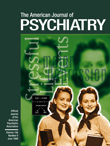Long-Acting Psychotraumatic Properties of a Cardiac Arrest Experience
Abstract
OBJECTIVE: Progress in resuscitation medicine allows an increasing proportion of patients to survive an out-of-hospital cardiac arrest. However, little is known about long-term adaptation to the vital breakdown. The present study assessed the long-term prevalence and severity of emotional disability of cardiac arrest survivors and ascertained whether survivors suffer from recurrent and intrusive recollections of the cardiac arrest. METHOD: Follow-up analysis was performed on all cardiac arrest survivors discharged from the hospital over a 5-year interval (1990–1994) in a defined inner city and suburban area. From 118 initially hospitalized cardiac arrest survivors, 45 patients were discharged alive from the hospital. After a mean follow-up period of 39 months (range=22–64), 25 patients exhibited sufficient cerebral performance for psychodiagnostic assessment; 21 patients were assessed. RESULTS: Despite an impaired ability to concentrate, cardiac arrest survivors had levels of psychological adjustment at follow-up that were similar to those of 35 cardiac patients whose clinical course was not complicated by cardiac arrest. However, the diagnosis of psychotraumatic symptoms in cardiac arrest survivors led to a sharp separation between favorable and nonfavorable outcome in affective regulation and level of functioning. Of the cardiac arrest patients, those with high scores of intrusion and avoidance (N=8) reported an enduring sense of demoralization with significantly more somatic complaints, depression, anxiety, lack of confidence in the future, and narrowing of social activities than those with low scores (N=11). Long-acting sedation at illness onset significantly predicted a favorable outcome. CONCLUSIONS: This study provides the first empirical evidence that the application of the posttraumatic stress disorder paradigm in the long-term evaluation of cardiac arrest survivors significantly contributes to defining a patient population at high risk for serious emotional disability.



